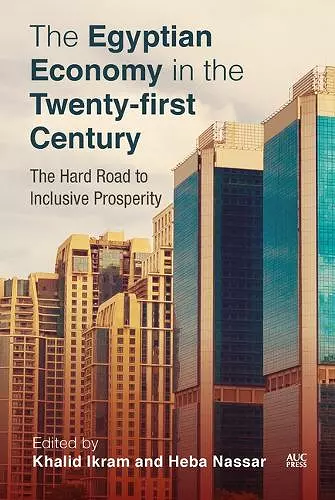The Egyptian Economy in the Twenty-first Century
The Hard Road to Inclusive Prosperity
Dr Khalid Ikram editor Dr Heba Nassar editor
Format:Hardback
Publisher:American University in Cairo Press
Published:29th Nov '22
Should be back in stock very soon

A multi-faceted account of Egyptian economic development by nineteen internationally recognized authorities and the critical challenges the economy is likely to face in the next twenty years
The Egyptian Economy in the Twenty-first Century addresses the question of why Egypt, despite possessing a plethora of assets—such as a fertile agriculture, a strategic geographic location, oil and gas deposits, innumerable tourist sites, a labor force prized by regional countries, and a diaspora that remits large amounts of funds—has seldom performed to its economic potential during the last sixty years. Indeed, economic weakness created political weakness, and often exposed the country to foreign diktats. What should the country do to change this state of affairs?
Nineteen internationally recognized authorities on the Egyptian economy discuss the critical challenges that the Egyptian economy is likely to face in the next two to three decades, challenges which must be overcome in order to improve the life of Egypt’s citizens and to protect the country from external pressures. Their analyses cover population and employment; development strategies; principal macroeconomic issues; development of a digital economy; fiscal and monetary matters; the external sector; poverty and income distribution; the enterprise structure; higher education; water availability; urbanization; institutional performance; and many others.
Contributors:
- Gouda Abdel Khalek, Cairo University, Cairo, Egypt
- Khaled M. Abu-Zeid, Regional Water Resources, CEDARE (Center for Environment and Development for the Arab Region and Europe), Cairo, Egypt.
- Fatma El Ashmawy, World Bank.
- Ragui Assaad, University of Minnesota, Twin Cities of Minneapolis and Saint Paul, Minnesota, USA
- Izak Atiyas, Economic Research Forum, Cairo, Egypt.
- Marwa Biltagy, Cairo University, Cairo, Egypt.
- Lahcen Bounader, International Monetary Fund.
- Ishac Diwan, École Normale Supérieure, Paris, France.
- Ahmed Ghoneim, Cairo University, Cairo, Egypt.
- Khalid Ikram, Washington DC, USA.
- Karima Korayem, al-Azhar University, Cairo, Egypt.
- Heba el-Laithy, Cairo University, Cairo, Egypt.
- Noha el-Mikawy, Ford Foundation, Middle East and North Africa, Cairo, Egypt.
- Mohamed Mohieddin, Menoufia University, Menoufia, Egypt.
- Heba Nassar, Cairo University, Cairo, Egypt.
- Osman Mohamed Osman, Cairo, Egypt.
- Noha Razek, University of Regina, Regina, Saskatchewan, Canada.
- David Sims, Cairo, Egypt.
- John Waterbury, Princeton, New Jersey.
"A collection of essays by many of the most distinguished social scientists working on Egypt today, this book provides a detailed and sobering picture of the country’s challenges after decades of negligent and inept economic management. . . . That said, no government of Egypt could ask for a better roadmap to a more hopeful future than the one outlined in these essays."—Foreign Affairs
"[A] highly readable account of Egypt’s economic situation and approaches to the twin challenges of providing its citizens with a better life and minimizing its vulnerability to external pressures. After Ikram’s extensive introduction summarizing the volume, 14 chapters—nearly all by Egyptian academics—discuss a wide array of issues, from demographic trends to higher education, urbanization to street children, water challenges to natural gas, and fiscal and monetary policies. . . . Highly recommended. Undergraduates through faculty; professionals; general readers."—CHOICE
“[This] book is a model of how to analyze a country's economic situation. It is rich in information and solid analysis, presented in a manner easily accessible by the general reader but well versed in economic theory.”—Middle East Quarterly
"A tour de force! Ikram and Nassar have assembled leading experts on Egypt and have compiled a masterful collection of strongly analytic yet highly policy-relevant chapters on key aspects of the economy. Critical challenges are identified with acuity, and vital recommendations are offered to help steer future policies. An excellent contribution and a must read." —Danny Leipziger, George Washington University
"This book brings together articles by well-known experts on the critical areas of the Egyptian economy, both its current situation, and the near term outlook. It not only addresses the challenges that the economy is currently encountering, but also provides the analytical framework that will be needed to assess and respond to the likely unforeseen economic effects of the possible structural shifts in the global economy in the period ahead. The book is an important contribution to understanding the evolving Egyptian political economy and helps establish a sound basis for formulating the needed policy reforms to achieve Egypt's medium term objectives."—Zubair Iqbal, Middle East Institute
“This tour de force is a major contribution to development economics in times of unprecedented and accelerating change. The chapters in this book set out to explain why Egypt, despite its numerous physical and human assets, has so frequently underperformed its economic potential during the last sixty years. The way out is by abandoning the current zigzag of incoherent policies in favor of a human-resource-based strategy similar to that of the East Asian Tigers. The main message may be summed up in the words of Albert Einstein: 'We cannot solve our problems with the same thinking we used when we created them.'”—Samir Radwan, Former Minister of Finance of Egypt
ISBN: 9781649031778
Dimensions: unknown
Weight: unknown
476 pages